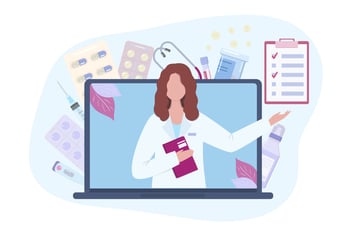Talking to Your Patients about EHR Software
Whether your practice has just started using a practice management and EHR software, or you've been using one for years, you may have patients who are still unfamiliar with this technology and might be concerned about having their health information stored electronically.
As a healthcare provider, you should be proactive about addressing your patients' concerns, and the best way to do that is to keep them educated. We provided some talking points below that will help answer a few common questions you might get from your patients.
How To Talk to Your Patients about EHR Software
What is a practice management and EHR system?
- EHR stands for electronic health record and practice management, and the EHR system is software that helps with every process in the practice, from scheduling to billing.
- In the system, we store a digital record of your health information.
- A key feature of an EHR is the ability to share information in your digital record with other providers involved in your care so you get better coordinated patient care.
How will the system benefit me?
On top of better-coordinated care, there are many more immediate benefits that you will experience during your visit. Here are some examples:
- Convenient scheduling: You can now schedule appointments online at your own time.
- Reduced wait time: Through our patient portal, you can submit pre-appointment paperwork which will allow you to proceed to your exam shortly after check-in.
- Reduced visit time: In general, a practice management and EHR system help speed up many processes in the practice, such as allowing the doctor to complete an exam faster. This means that you are able to be done with your appointment sooner.
- Better education: When you are done with your visit, you are also able to use the patient portal to receive treatment instructions and lab results, and communicate to your doctor securely over email.
How safe is personal information when it's stored electronically?
The practice management and EHR system that we use is HIPAA compliant. The Health Insurance Portability and Accountability Act (HIPAA) Privacy Rule, a federal law, uses the same privacy rules to protect your paper records. With EHRs, there are additional security features like passwords and digital fingerprints to safeguard your information. You have rights over your information and you can set rules and limits on who can look at and receive your health information.
This information can be very overwhelming for your patients, and it might be time-consuming to explain it to your patients individually. A good way to save time is to leave this information out by the front desk on a brochure or a one-page printout, especially if your practice is just transitioning to a practice management and EHR system. Assure them that nothing has changed, and they can look forward to more efficiency in your practice that will also benefit them.
To learn more about how Uprise EHR & PM make your patients’ lives easier, click the link below:
Editor's Note: This post was originally published on Feb. 14, 2015. It has been updated for relevance and richness of content on June 26, 2021.

